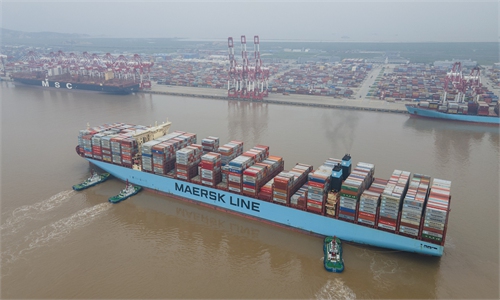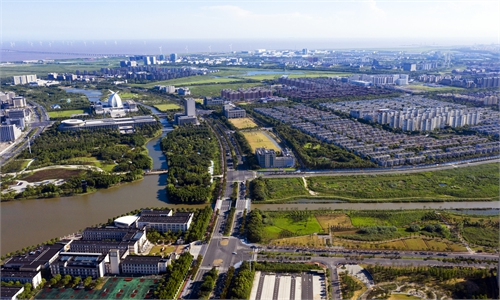Dual circulation to facilitate a leveled playing field for foreign companies in China

Visitors at the Beijing International Automotive Exhibition 2020 Photo: Li Hao/GT
China's new development strategy, particularly the dual circulation, will play an important role in motivating the recovery of world economy and establishing a leveled playing field for foreign companies looking for market opportunities in China, several representatives from participating companies said during the China Development Forum on Sunday.
China is a major driver of the world economy and an increasingly important market for global goods and services. The dual circulation is a new development strategy that will not only serve economic development in China, but also meet the demand of the people in the world, according to Qian Keming, Vice Minister of Commerce of China.
"China imported around $2 trillion in goods and $500 billion in services each year, the equivalent of the total GDP of France," Qian said. "The demand is crucial to internal circulation, without which the growing demand for quality products and services cannot be met."
Qian also noted that the gap between the domestic supply of quality products and services and the domestic demand is creating unprecedented opportunities for multinational manufacturers and service providers. For example, by 2023, total car sales in China are estimated to reach 30 million, a massive market for global car makers.
"It will be a major market for automakers such as Daimler," Qian said.
The dual circulation is also reshaping the role of China in the global economy by changing its structure using foreign investment and technology. According to Qian, China's comparative advantage, which used to be its cheap labor force, is subduing and now it has transformed itself into a hot spot for foreign investment because of its open economy and good business environment.
"Our focus now is to attract and keep quality investment from overseas," Qian said, and added that "currently, out of the 69 companies which are deemed as bellwethers in the fourth industrial revolution, 21 have investment in China."
China is now striving to attract more quality foreign companies by rolling out an increasing number of policies to create a leveled playing field for multi-national corporations so they can enjoy the benefits of the fast development of the Chinese economy.
The negative list for foreign investment is constantly being reviewed and shortened, Qian said. Currently, there are only 33 limits on the list, and the government is also further simplifying the process for foreign investors while opening up its service sector. It is also working to integrate Chinese and foreign business standards, and the implementation of more international cooperation intuitions, including the Regional Comprehensive Economic Partnership (RCEP) and the bilateral investment treaty between the EU and China will be accelerated.
China is now the top trading partner for 124 countries and overtook the US as a leading destination for foreign investment in 2020. A strong Chinese economy is also a boost in confidence to foreign companies.
"This statistic itself reflects the progress in the opening up of China in the last two years. The market reform has been particularly profitable in the financial services industry, the removal of the foreign equity cap in various financial services sectors, the inclusion of China securities instruments into global equities and bond indices, and the enhancements in the business and operating environments… these have all contributed to the record inflows into China capital markets last year," John C Dugan, chairman of Citigroup said.
Apart from the service sector, global manufacturers have also been benefiting from the Chinese economic development.
"16 years ago, we put on for an annual volume of 25,000 cars an hour, with better production together with our local partner in Beijing, and in 2020, we produced over 600,000 cars. That's 24 times for initial backlog," said Ola Källenius, Chairman of the Board of Management of Daimler.
Executives of global pharmaceutical giants also show confidence in Chinese economy.
Lars Fruergaard Jørgensen, president and CEO of Novo Nordisk, said the company has been deeply rooted in China for the past 27 years, and it has established a local presence covering the full value chain, from R&D and production to commercial operations. Today, China has become its second-largest market.
"We are impressed by China's resilience in economic recovery and advancing a 'dual circulation' strategy combining domestic development and global integration. In China, Novo Nordisk contributes to local innovation and achieved robust growth during 2020 as a consequence of increasing domestic demand," he added.
Paul Hudson, CEO of Sanofi, said the company launched six innovative products in China last year, and it is on track with a plan to launch 25 innovative medicines and vaccines in China by 2025. It is looking forward to creating the conditions for stronger partnerships and collaboration between industry and authorities in manufacturing essential medicines in China.



